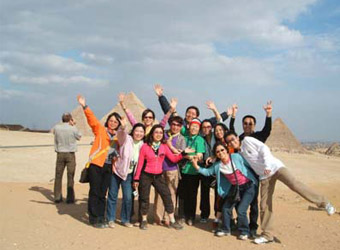Vendors at Egypt’s pyramids who are desperate to make money in a deepening economic crisis are using aggressive and even violent means to get tourists to give them some business, frequenters of the tourist spot say.
The U.S. Embassy issued a warning about increasing incidents at or near the famous pyramids at Giza about a dozen miles from downtown Cairo. Most of the incidents are due to overly aggressive vendors who in some cases come close to criminal conduct, the embassy says.
“U.S. citizens should elevate their situational awareness when traveling to the pyramids, avoid any late evening or night travel, utilize a recommended or trusted guide, and closely guard valuables,” according to a security message on the embassy’s website last week.
Visitors going toward the ancient complex, roughly an hour’s drive in traffic from central Cairo, are encountering Egyptians who work in the tourism sector and surround and pound on tourists’ taxis and cars in what the embassy says may be an effort to pressure visitors to ride in their horse-drawn carriages.
In some cases, angry vendors have tried to open vehicles’ doors, frightening visitors, the embassy said.
Egypt’s minister of antiquities, Ahmed Eissa, insisted the Giza pyramid complex is safe. He said neither his office nor the tourism police have received complaints, according to newspaper reports.
Others who have traveled to the area say the problems are real.
“It’s a new level of frightening,” said Graham Harman, associate provost for research administration and professor of philosophy at the American University in Cairo.
Vendors began the practice of banging on cars pulling up to the pyramids within the first six months after Egypt’s revolution in 2011. Once tourists enter the complex gates the harassment continues.
Vendors selling camel rides, horse jaunts or souvenirs pressure visitors to make overpriced purchases, and others aggressively demand money for nothing.
Harman, who is originally from Iowa but has lived in Egypt for 13 years, visits the pyramids frequently by taxi and says he wouldn’t advise anyone to go without an organized tour based on an experience he had in March in which his wife was harassed and police asked for money.
“This was something new,” he said. “People were much more aggressive.”
The United States isn’t the only country to issue warnings. The United Kingdom’s Foreign and Commonwealth Office advises against all but essential travel to the south Sinai, with the exception of popular Red Sea vacation spots and specific routes, while the north Sinai is listed as off-limits.
Egypt’s revolution and election of an Islamist government after decades of military dictatorship has not led to improvements in the economy. Unemployment remains high and income low.
Visitors to Giza can see the depth of financial despair evident among those who work in the tourism industry, a main source of income for many Egyptians. Many vendors seem starved for travelers. Stable owners who offer horseback rides through the sprawling desert have fed their horses hay that was bought on loan while others over the past two years have been forced to sell their animals.
Tourism is diminished across the country.
Ayman Hussein works for a travel agency in Aswan, a city in Upper Egypt not far from Sudan that is near a set of magnificent temples. He said tourism has dropped by more than half since the days before the nation’s uprising.
“Please tell the people: Come to Upper Egypt,” Hussein said.
Making matters worse, prices of electricity and basic foods have been rising.
“It’s very hard,” Hussein said, but he brushed off news that there may be dangers hundreds of miles away at the Giza pyramids.
“We love the tourists,” he said. “Don’t worry about this.”
USA Today



